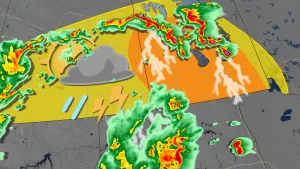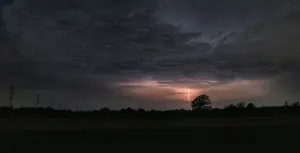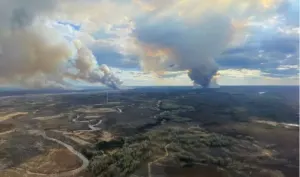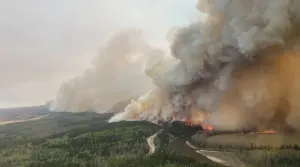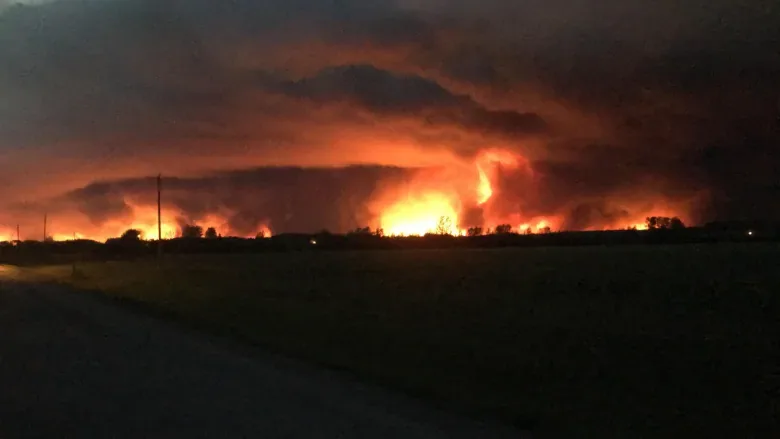
Military personnel, planes move to help with Alberta fires
The federal government will send military personnel and aircraft to Alberta to help with evacuation efforts as the province deals with raging wildfires.
Minister of Public Safety Ralph Goodale told CBC News on Friday the province had that morning asked for help with the massive forest fires near the northern towns of High Level and Slave Lake.
Alberta asked for help with evacuations and medical aid, among other things, he said.
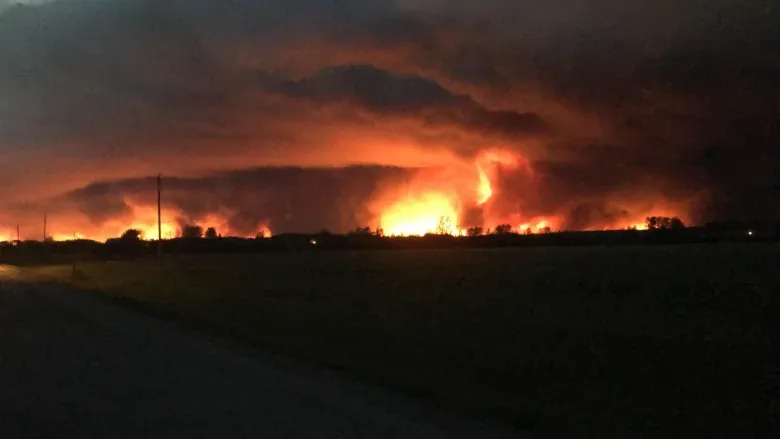
(The Chuckegg Creek fire is seen near Paddle Prairie, Alta. The fire is now travelling at a rate of about 23 metres a minute. CBC - Dean Ducharme)
"Those are very strong capabilities of the Canadian Armed Forces, and of course our answer was yes," Goodale said. "And we are now in the process of mobilizing that assistance."
Summer revealed! Visit our Complete Guide to Summer 2019 for an in depth look at the Summer Forecast, tips to plan for it and much more
As fires continue to rage out of control, the community of Trout Lake, about 300 kilometres northeast of Grande Prairie, was under an evacuation order Friday.
The order to leave came after days of tinder-dry conditions and sweltering heat led explosive growth in wildfires burning across northern Alberta. Wildfires raging across the region have forced about 10,000 people from their homes.
An Alberta emergency alert issued at 8:15 a.m. tells all Trout Lake residents to leave immediately.
Buses at Kateri School in the community will be provided to help transport people from the area.
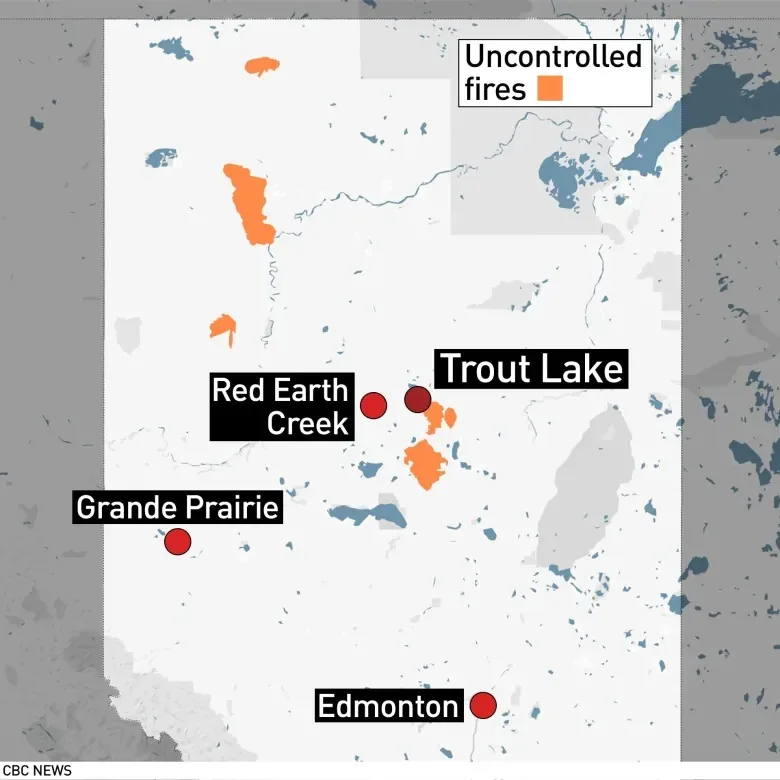
Other areas of Peerless Trout First Nation must be prepared for evacuation on short notice, the alert said.
Evacuees must attend the Back Lakes Arena in Red Earth Creek to register and receive further information. The remaining persons in Peerless Trout First Nation must be prepared to evacuate on short notice, the alert said.
A wildfire threatening the community started Sunday about 14 kilometres southeast of Trout Lake. As of Thursday night, the fire had grown to around 133,000 hectares in size.
'HEARTBREAKING'
Meanwhile, more than a dozen homes have reportedly been destroyed by wildfire in Paddle Prairie Métis Settlement.
Lori Wanuch, vice-chair for the settlement council, said 15 homes on the northern edge of the remote northern Alberta community have burned to the ground.
"It's been very difficult. A lot of people have been doing a lot of crying," Wanuch said Friday in an interview with CBC Radio's Edmonton AM.
There are about 230 homes in the settlement, 70 kilometres south of High Level. Some residents remain at evacuation centres in Grande Prairie, waiting anxiously for news, Wanuch said.
"We have a lot of homes that are along the bush which is the very scary part. We're just hoping that they can get it under control. Hope and pray that no more homes are lost, that's all we can do."
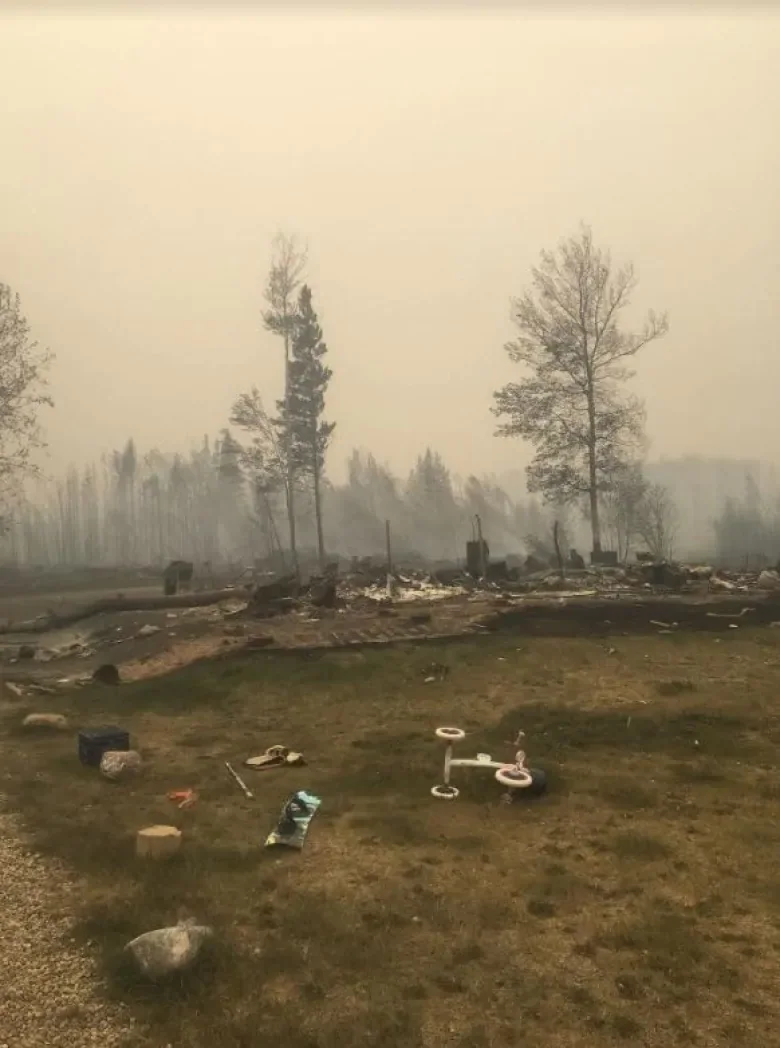
(Fifteen homes have reportedly been destroyed in the Paddle Prairie settlement. CBC - Lori Wanuch)
SEE ALSO: High Level wildfire blows 'smoke rings' at sunrise, see why
Provincial officials have been unable to confirm that any homes in the community were lost in the fire but said damage assessments are underway. Wanuch said that when the community was evacuated due to heavy, acrid smoke, residents never imagined their homes might burn.
She said the community was not adequately warned about the impending flames.
"We were reassured that we were under no threat from the fire so that's why we didn't pack anything," Wanuch said.
'THOSE PETS DIDN'T STAND A CHANCE'
"Their houses burned down and they didn't take anything but their clothes.
"I was told that some of their pets were still inside the homes when they burned ... Those pets didn't stand a chance. It's just heartbreaking."
The updated figure was provided Thursday afternoon, after a day of hot temperatures and gusty winds led to the explosive growth of several blazes burning out of control.
About 5,000 people have been out of their homes in and around High Level for more than a week.
Several communities, including Wabasca, the Bigstone Cree Nation and Chipewyan Lake Village, have fallen under evacuation orders since Wednesday.
People in Slave Lake, a town that was partially destroyed in a 2011 blaze, have been told to be prepared to leave with eight hours notice because of a fire that the mayor says is burning about 30 kilometres away.
Smoke from the fires enveloped points south, including Edmonton, in a thick, acrid, haze that limited visibility and made it difficult to breathe.
'THIS FIGHT IS GOING TO BE A TOUGH ONE'
The government said weather forecasts for the next two weeks will make fighting the fires difficult. Firefighters are in Alberta from across Canada doing their best to corral the flames.
"This fight is going to be a tough one," said Devin Dreeshen, Alberta's minister of agriculture and forestry. "The weather is not co-operating for the long-distance forecast for the next two weeks. It's more of the same, of hot, dry and windy conditions.
"Albertans need to prepare themselves for this situation for the foreseeable future."
While an evacuation order was issued Thursday afternoon for the hamlet of Marten Beach, about 20 kilometres north of Slave Lake, Slave Lake Mayor Tyler Warman said the fire was not an immediate threat to his community.
The biggest blaze is the Chuckegg Creek fire raging near High Level, which covered 2,300 square kilometres Thursday.
Derek Gagnon, a provincial information officer, said the Chuckegg Creek fire grew by 800 square kilometres in 24 hours and travelled more than 22 kilometres on the ground.
"The average speed would then be around 23 metres per minute," Gagnon said. "We had really strong winds out of the north that combined with really dry fuels."
While the flames have been kept out of High Level, Mayor Crystal McAteer, Reeve Josh Knelsen of Mackenzie County and Dene Tha' First Nation Chief James Ahnassay issued a joint statement urged residents who were out of their homes to be patient.
Wanuch had a warning of her own for communities at risk from the flames.
"Don't wait until it's too late," she said.
"If you feel like your members or community is at risk, don't wait until the authorities tell you. Get out while you can."
This article was originally published on CBC.ca with files from The Canadian Press






